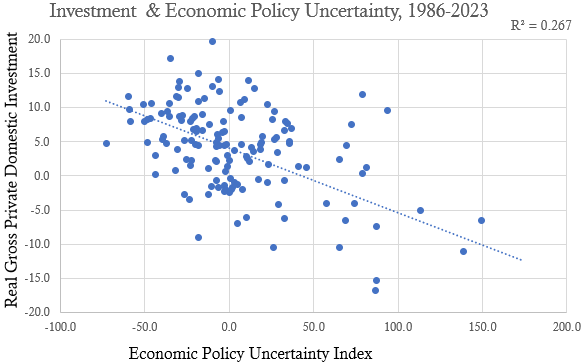Last week I posted something on how business confidence affects capital investment. Many factors may affect business confidence. The psychological mindset of business owners might change on its own. Public policies may affect business confidence too. Scholars at the University of Chicago developed an economic policy uncertainty index, which estimates our felt ambiguity regarding public policies1. The next graph depicts lagged effects of year over year changes in policy uncertainty on year on year changes in gross private domestic investment.
As one might expect, higher levels of policy uncertainty correlate with lower levels of private investment (by 27%). Economic theory posits that fiscal and monetary policies work best when the public doesn’t know what to expect next. Why? Reactions of informed businesses and workers to stimulative policies nullify the stimulative effects of these policies. Consequently, policymakers avoid signaling their policy moves. Alan Greenspan developed a stellar reputation in the press, based on his ability to craft cryptic answers to policy questions at official hearings.
Many economists doubt the effectiveness of stimulative policies, and rightly so. An open and fully transparent government lacks the ability to stimulate the economy. Secretive implementation of stimulative policies solves some problems with policy effectiveness, while also creating others. People do anticipate policies to some degree, and their reactions to new policies makes the actual results of policies unpredictable (see past posts on this here, here, and here). To the extent that entrepreneurs don’t know what to expect from policies that affect inflation rates and the total public debt, some will postpone their investment plans.
Many policymakers and economists believe that they are smart enough to manipulate all the rest of us, in a consistent and reliable manner. This belief is an example of what Hayek and Bartley referred to as “the fatal conceit”. Modern economies are complex beyond anyone’s comprehension. This complexity stems from the reality that modern society is the result of self-interested competition among billions of thinking people. Those who believe themselves capable of managing the economy overrate their own intellects massively. The rest of us should view all efforts of a few to manage the rest of us not simply as an exercise in futility, but as a threat to our future prosperity.
There are economic policy uncertainty indexes specifically for monetary and fiscal policies. However, these other indexes are presently available on a monthly basis, not quarterly. The monetary and fiscal economic policy uncertainty indexes correlate very strongly with the general policy uncertainty index.



